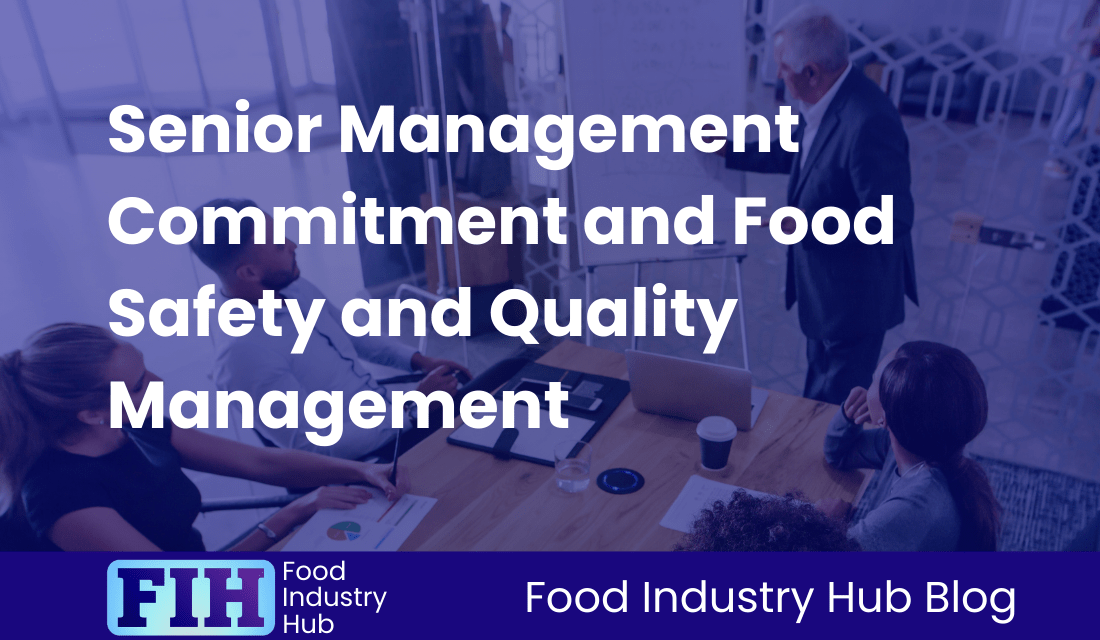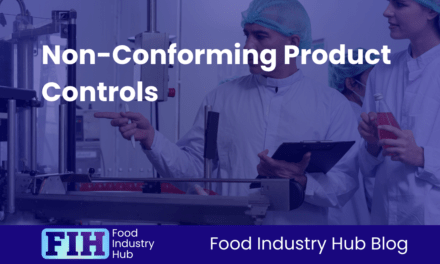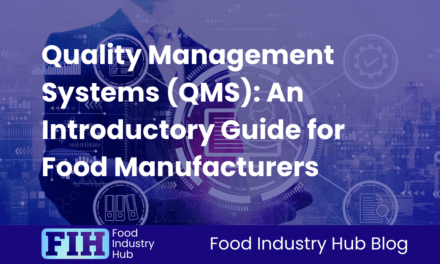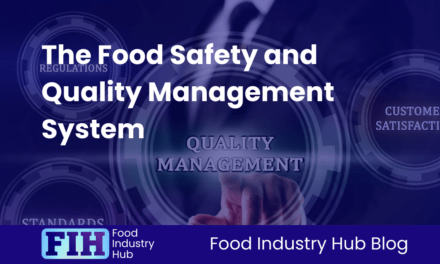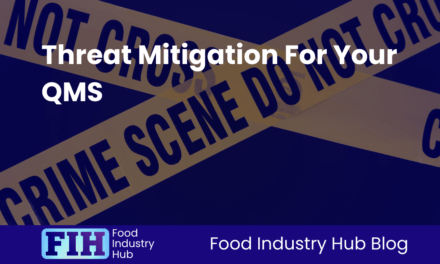Introduction
Consider the role of senior management in your organisation’s food safety and quality management. Senior management commitment isn’t just a formality; it’s the backbone of establishing and maintaining a culture of accountability and excellence. They’re not just figureheads, they’re the drivers of policies, the facilitators of training, and the champions of open communication. But how critical is their role in ensuring product safety, compliance with regulations, and preserving consumer trust? Could their involvement be the determining factor between success and failure? Let’s explore this further.
As we dive into the topic, you’ll be interested to know that Food Industry Hub offers integrated management systems for food manufacturers, which you can use to strengthen your assurance processes.
Table of Contents
Key Takeaways
- Senior management emphasises commitment to food safety by endorsing policies and setting high standards for product quality.
- They play a crucial role in driving a food safety culture, guiding vision, and inspiring organisational compliance.
- Regular audits, performance measurement, and data-driven decisions led by senior management enhance the overall food safety culture.
- Senior managers actively solicit employee feedback and customer insights to inform necessary adjustments in food safety practices.
- They are responsible for developing and reviewing action plans, while also ensuring mandatory attendance at annual review meetings.
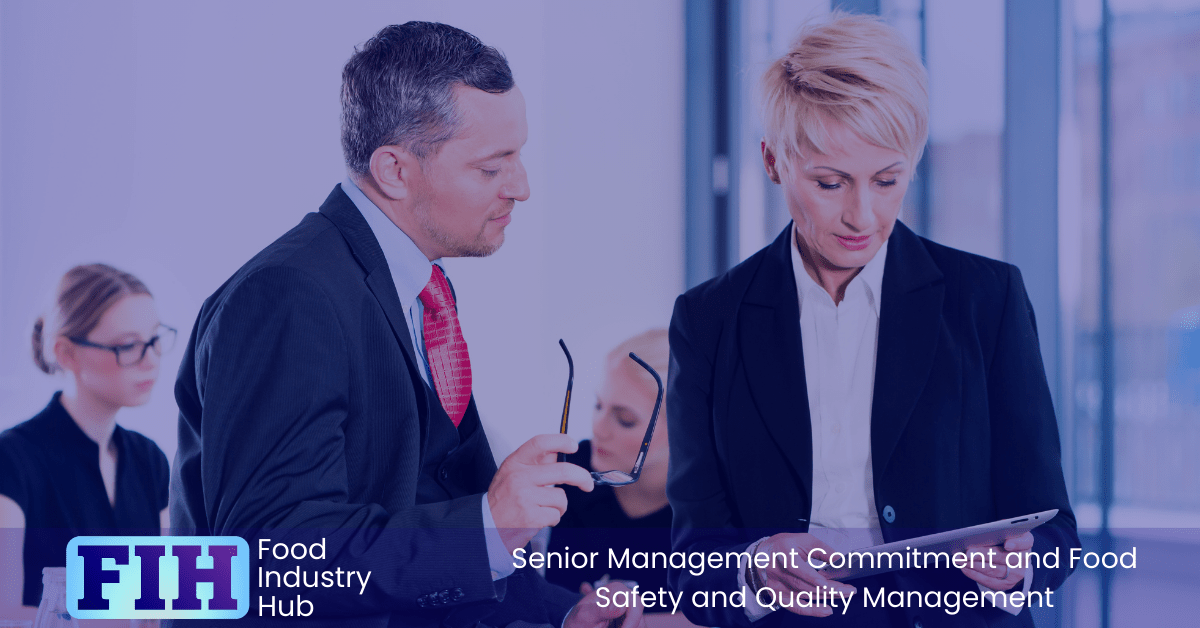
Food Industry Hub Management Systems delivers an optimised approach to food safety, ensuring your quality management system operates with heightened efficiency, boosting trust and ensuring top-level quality assurance throughout your operations.
The Policy for Product Safety, Legality, Authenticity, And Quality
You’re tasked with setting your site’s objective to not only produce food that’s safe, legal, and authentic, but also meets the specified quality.
This intention also extends to fulfilling your obligations to your customers.
To demonstrate your commitment, you sign the policy yourself, emphasising the need to communicate it to all staff and maintaining the drive to continuously enhance your site’s food safety and quality culture.
Establishing The Site’s Intention to Meet Its Obligation to Produce Safe, Legal and Authentic Products to The Specified Quality
To ensure the production of safe, legal, and authentic products of specified quality, it’s crucial to establish clear and robust policies. You should involve your team in the policy creation process, ensuring everyone’s on the same page.
Your policies should clearly state your site’s intention to adhere to all relevant food safety and quality standards. This includes abiding by legal requirements and producing authentic products that meet the specified quality levels. It’s not just about ticking boxes for compliance; it’s about committing to a culture of safety and quality.
Remember, your policies should be more than just words on paper. They need to be lived and breathed by everyone on your team, from senior management to the production floor. Implement regular training sessions, so everyone’s aware of their role in maintaining product safety, legality, and authenticity.
It’s also essential to regularly review and update your policies, ensuring they remain relevant and effective. This proactive approach will show your commitment to maintaining high standards, demonstrating that your company isn’t just meeting obligations, but exceeding them.
Establishing The Site’s Intention to Meet Its Obligation to Its Customers
How does your site plan to meet its obligation to customers when it comes to product safety, legality, authenticity, and quality? It’s crucial to establish a clear policy that outlines these commitments. This policy sets the tone and provides a roadmap for all team members to follow, ensuring consistency in actions and decisions.
Legality is of utmost importance. Confirm that you’re abiding by all relevant laws and regulations in your industry. This includes proper licensing, appropriate labelling, and any required inspections or certifications.
Authenticity is key in maintaining trust with your customers. Ensure that your products are genuine and that any claims made about them can be verified.
Lastly, quality should never be overlooked. The products you offer should meet established industry standards and consistently deliver the performance or taste that consumers expect.
Demonstrating Commitment by Having the Policy Signed by The Person with Overall Responsibility for The Site
Once your team has crafted a comprehensive policy focusing on product safety, legality, authenticity, and quality, it’s crucial for the person with overall site responsibility to sign it, demonstrating a solid commitment to these principles.
This signature isn’t merely a formality; it’s a powerful statement of intent. It communicates that the policy isn’t just words on a page, but a way of life at your site.
This person, often the CEO or site manager, carries weighty influence. Their signature signals that they’re not just aware of the policy, but they fully endorse it. It’s a clear sign that they’re leading the charge in upholding these standards. It also shows that they’re ready to be accountable for any shortcomings or failures in these areas.
This symbolic act also serves to boost morale amongst the workforce. It’s a tangible demonstration that the person in charge is actively involved and shares the same commitment to quality, safety, legality, and authenticity as the rest of the team.
The Importance of Communicating the Policy to All Staff
After the policy receives the official stamp of approval with the signature of the person in charge, it’s your responsibility to ensure every member of your team understands and adheres to it.
Communication isn’t simply about sending out emails or pinning notices on the bulletin board. It’s about making sure the information is understood, absorbed, and more importantly, put into action.
Remember, the effectiveness of any policy lies in its implementation. You’re not aiming for mere awareness, but compliance. So, it’s crucial to use clear, concise language that leaves no room for interpretation. Don’t just assume that people have understood everything; check in regularly, answer queries, and encourage open dialogue.
It’s essential to instil in your team members the significance of the policy. Explain how it impacts the company’s reputation, their job stability, and even their personal health. Make them understand that they’re all custodians of the company’s quality and safety standards.
Including A Commitment to Continuously Improve the Site’s Food Safety and Quality Culture
To elevate your site’s food safety and quality culture, it’s crucial to commit to constant improvement in the areas of product safety, legality, authenticity, and quality.
As a senior manager, you play a pivotal role in setting the tone for this commitment. You create an environment where everyone feels responsible for food safety and quality.
This requires an ongoing process of reviewing and refining current practices. It’s not enough just to meet the minimum standards – aim to exceed them. Regular audits can help identify any gaps in your site’s food safety and quality culture and provide an opportunity to address them.
Include staff at all levels in this continuous improvement process. Their input can be invaluable in identifying areas of potential risk and suggesting practical solutions.
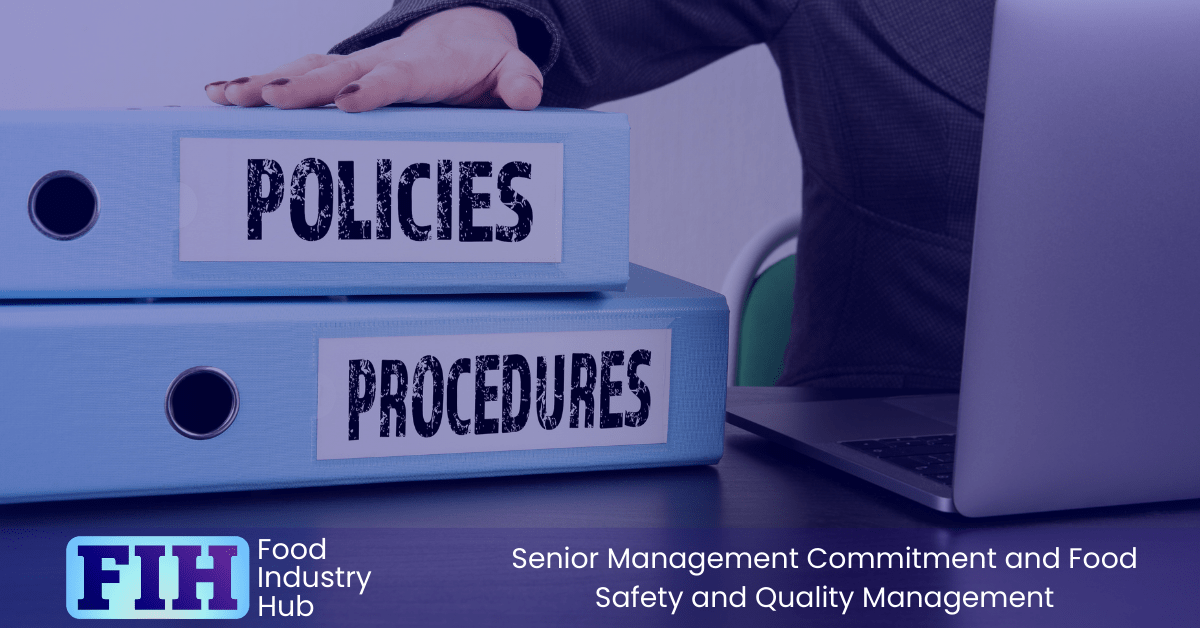
The Plan for The Development and Continuing Improvement of a Food Safety and Quality Culture
As you move forward in your role, it’s essential to have a solid plan for improving food safety and quality culture.
This plan, led by senior management, needs to involve all sectors of the site that impact product safety.
The Plan for The Development and Continuing Improvement of a Food Safety and Quality Culture Must Be Owned by The Senior Management Team
Senior management’s ownership of the plan for enhancing food safety and quality culture is crucial, setting the tone for the whole organisation.
It’s their vision and commitment that guide the culture of food safety and quality, driving its continuous improvement.
As a stakeholder, you should understand that this isn’t a mere delegation of tasks. The senior management team doesn’t just assign responsibility; they take it.
Every decision, every strategy, is theirs. They’re the ones setting the goals, defining the values, and fostering a culture of accountability.
They set the bar high and ensure everyone strives to reach it. Their proactive involvement signifies the importance they place on food safety and quality, inspiring the rest of the organisation to do the same.
The Plan Must Include Defined Activities Involving All Sections of The Site That Have an Impact on Product Safety
In developing and continuously improving a food safety and quality culture, it’s essential that you include defined activities across all site sections impacting product safety. This isn’t just about the obvious areas, like the manufacturing zones or packaging lines. It’s about every nook and corner, from storage and receiving, right through to dispatch. Each area has a role to play and can potentially affect the safety of your food products.
You’ll need a comprehensive plan that outlines specific activities for each section. These activities should be designed to maintain and enhance food safety and quality standards.
For instance, regular inspections and hygiene checks in storage areas can prevent contamination. Likewise, properly training staff on safe handling procedures can lower the risk of accidents that could compromise product safety.
Mandatory Expectations for The Plan for The Development and Continuing Improvement of a Food Safety and Quality Culture
You’ve got to recognise that the development and continuous improvement of a food safety and quality culture is a strategic priority. The development of your company’s culture shouldn’t be allowed to happen by accident.
It’s essential to establish clear communication on product safety, implement training programs, and encourage feedback from employees.
You also need to define the behaviours necessary for the maintenance of safety processes and measure performance related to the safety, authenticity, legality, and quality of products.
Clear And Open Communication on Product Safety
To foster a culture of food safety and quality, your company’s plan must prioritise clear and open communication about product safety.
Honesty is crucial. Be upfront about potential risks and how you’re mitigating them.
This transparency builds trust with customers and stakeholders and promotes accountability within your team.
Training
Cultivating a robust food safety and quality culture demands continuous training and development for your team.
Training isn’t merely a one-time event, but an ongoing process. It’s crucial to equip your team with the latest safety protocols and quality control methods.
Keep them updated, engaged, and able to tackle challenges with confidence. This commitment to training fosters a proactive, safety-conscious work environment.
Feedback From Employees
It’s mandatory for your plan to have provisions for actively seeking and implementing this feedback.
Your employees’ insights can reveal hiccups in the system, allowing you to make necessary adjustments.
The Behaviours Required to Maintain and Improve Product Safety Processes
In the journey of improving food safety and quality culture, understanding the necessary behaviours and attitudes is absolutely crucial.
You need to foster a proactive approach, encouraging continuous learning and risk management.
The food safety and quality culture development plan should be highly specific about particular behaviours that are desirable and conducive to food safety and quality. The plan should also identify behaviours identified as undesirable due to their deleterious effect on the company’s culture.
Practically, the plan should clearly define behaviours that a senior leadership would expect to improve food safety and quality processes – so for example, this might include reporting mechanisms for risk escalation and suggestions for process improvement.
Consistent communication and collaboration among all staff is essential.
Everyone’s commitment to maintaining and enhancing safety processes is key to driving the culture of food safety and quality forward.
Performance Measurement of Activities Related to The Safety, Authenticity, Legality and Quality of Products
Building on the behaviours and attitudes necessary for food safety, you also need to measure the performance of these activities to ensure the safety, authenticity, legality and quality of your products.
Performance metrics can give you critical insights into your operations, helping you identify any potential weaknesses or inconsistencies that could compromise your food safety and quality culture.
An Action Plan Indicating How the Activities Will Be Undertaken and Measured, And the Intended Timescales
To foster a robust food safety and quality culture, you’ll need a detailed action plan that outlines how each activity will be undertaken, measured, and the intended timeline for its completion.
This plan should be specific, measurable, achievable, relevant, and time-bound (SMART).
It’s a roadmap to success, guiding your efforts in maintaining the highest safety and quality standards in your food operations.
A Review of The Effectiveness of Completed Activities
Once your action plan is in motion, it’s equally important to consistently evaluate the effectiveness of completed activities as part of your ongoing commitment to improving food safety and quality culture.
Review each task’s success against intended outcomes. Use this insight to refine your approach, ensuring your actions are truly driving improvements.
The Plan for The Development and Continuing Improvement of a Food Safety and Quality Culture Must Be Reviewed and Updated At Least Annually
Ensure you review and update your plan for the development and improvement of a food safety and quality culture at least once a year. This task isn’t just a checkbox to tick off; it’s crucial for the ongoing success of your business.
Remember, the food industry’s landscape is continually changing, so your strategy must be flexible enough to adapt. You’re not just responding to changes in food safety regulations, but also shifts in consumer expectations and technological advancements.
When you’re reviewing your plan, don’t just look at what’s working. It’s equally important to identify any challenges or areas where you’re falling short. The goal isn’t to maintain a status quo, but to constantly strive for improvement.
Involving your team in this process is key. They’re the ones on the frontlines, and their insights can be invaluable. They’ll also be more committed to implementing changes if they’ve had a hand in shaping them.
Remember that this isn’t a one-and-done deal. You’ll need to be prepared to revise and refine your plan continuously. It’s an ongoing commitment to food safety and quality culture, and it’s one that every member of your team should share.
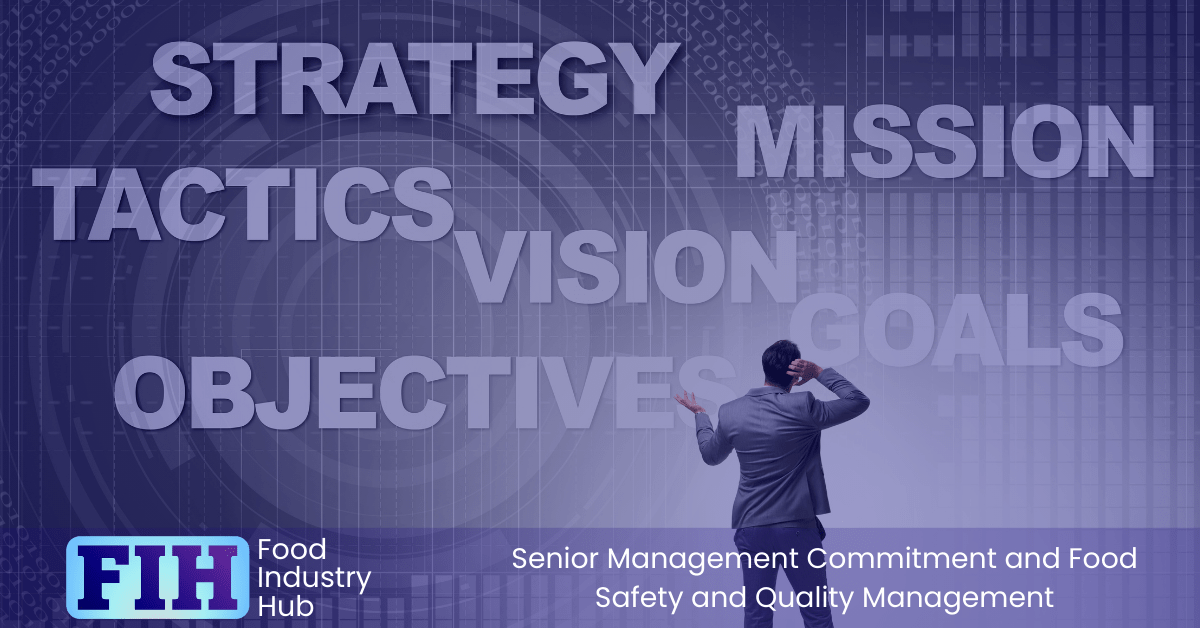
The Site’s Senior Management Must Ensure That Clear Objectives Are Defined to Maintain and Improve the Safety, Authenticity, Legality and Quality of Products Manufactured
As a part of the senior management team, it’s your responsibility to ensure clear objectives are set to uphold food safety and quality management.
You must create and document these objectives, including pertinent targets and measures of success.
Remember to communicate these objectives to all staff and monitor their progress, reporting results at least quarterly to everyone involved.
The Objectives Must Be Documented and Include Targets or Clear Measures of Success
To uphold food safety and quality management, your senior management must clearly define and document objectives, complete with measurable success targets. These objectives are the stepping stones to achieving the overall goal of maintaining food safety and quality.
It’s not enough to just set objectives – they must be documented. This ensures there’s a tangible record of your objectives, cementing their importance and providing a reference for your team. Documentation also eliminates ambiguity, providing clarity and a firm basis for action.
Your objectives shouldn’t be vague or abstract; they must be measurable. This means that each objective should have a clear target or measure of success attached to it. Whether it’s a percentage increase in food safety compliance or a reduction in quality-related incidents, these targets provide a clear measure of what success looks like.
In essence, clear, documented, and measurable objectives are crucial in steering your team towards maintaining food safety and quality. They ensure accountability, enable progress tracking, and provide a clear vision of what your organisation is working towards.
The Objectives Must Be Clearly Communicated to All Staff
Once your objectives are set and documented, it’s critical for your senior management to effectively communicate them to all staff members. This isn’t just about sending a memo or an email – it’s about ensuring that every team member understands what these objectives mean in terms of their daily work.
Remember, it’s not enough to inform; you must also engage. Hold meetings, workshops, or training sessions to explain the objectives. Use simple, clear language that leaves no room for misunderstanding.
If you’re aiming for a significant reduction in food safety incidents, for example, explain what specific actions will contribute to that goal.
But don’t stop at the what; explain the why. Help your employees understand why these objectives matter. If they see how their efforts contribute to safer food and a more successful business, they’re more likely to buy into the objectives and work hard to achieve them.
The Objectives Must Be Monitored, And Results Reported At Least Quarterly to Site Senior Management and All Staff
Regularly monitoring and reporting your objectives’ progress isn’t just a good idea — it’s essential, and it must be done at least quarterly to keep both your senior management and all staff informed and aligned. This isn’t just about ticking off boxes or meeting deadlines; it’s about ensuring everyone is on the same page and working towards the same goals.
It’s your responsibility to track your operations, analyse the data, and communicate the results. You can’t just set objectives and hope for the best. You have to actively monitor your progress, identify any problems, and take corrective action if necessary. When you report to senior management, you’re showing them that you’re committed to maintaining the standards they’ve set.
And don’t forget about your staff. They’re the ones on the frontlines, ensuring food safety and quality every day. By keeping them informed, you’re not only promoting transparency, but you’re also empowering them to take ownership and to be part of the solution.
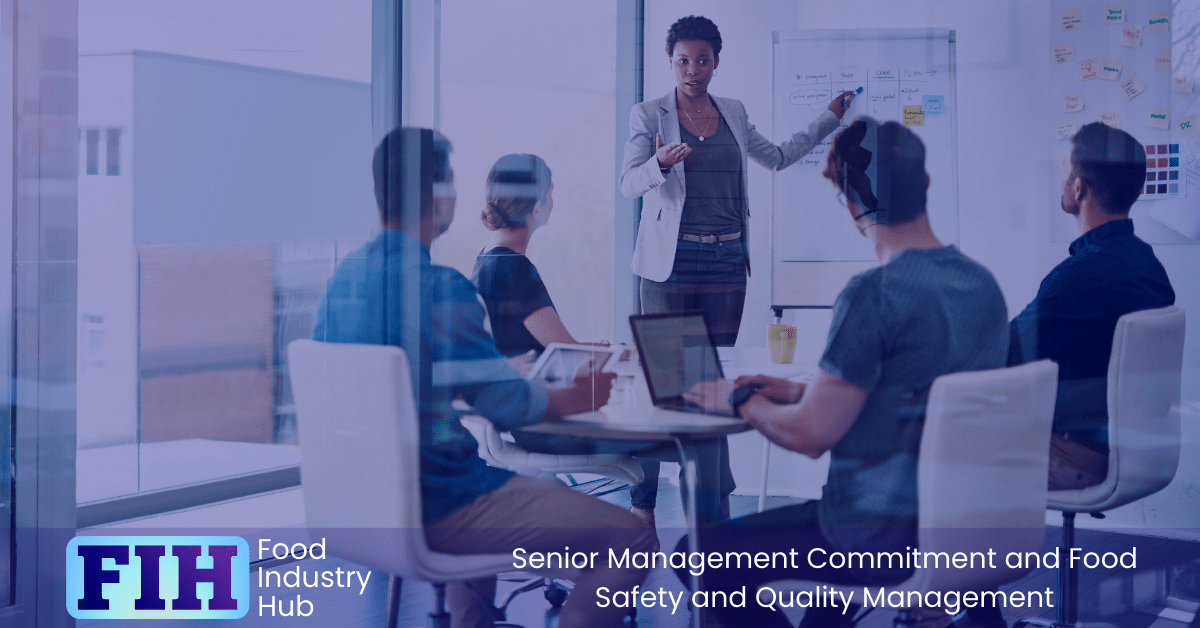
Sign-up for the Food Industry Hub Mail Service
We regularly produce new content for food industry professionals, and the Food Industry Hub Mail Service is the best way to stay up to date with the latest additions.
Signup today to be added to the Food Industry Hub mailing list.
Senior Management Review Meetings
Senior management commitment includes senior management’s attendance at review meetings, where they’ll assess the site’s performance in maintaining and improving product quality and safety.
These meetings must occur at least once a year.
You’ll need to evaluate mandatory agenda items and discuss the outcomes at these essential meetings.
The Site’s Senior Management Must Attend Management Review Meetings to Review the Site’s Performance Against Its Objectives for The Maintenance and Improvement of The Safety, Authenticity, Legality and Quality of Products Manufactured
As key players in the organisation, it’s crucial for the senior management to participate in review meetings, scrutinising the site’s performance to ensure the safety, authenticity, legality, and quality of the products being manufactured.
Your presence at these meetings isn’t just a formality. It’s an opportunity for you, as a senior manager, to actively engage in discussions, ask probing questions, and make informed decisions based on the data presented. You’re not just a spectator; you’re an active participant who can influence the outcome.
Remember, you’re not evaluating performance for the sake of finding faults. Instead, you’re looking for ways to maintain and improve the standards already in place. Your goal is to ensure that the products manufactured meet the safety, authenticity, legality, and quality standards expected by your consumers.
It’s your responsibility to understand the implications of the review’s findings and to act accordingly. If the site’s performance isn’t up to par, it’s your job to devise strategies for improvement. You can’t afford to be complacent in this role. After all, the success of your organisation hinges on your commitment to these meetings and the actions you take as a result.
Senior Management Review Meetings Must Be Held At Least Annually
To keep your finger on the pulse of your organisation’s performance, it’s essential to hold senior management review meetings at least once a year. These meetings play a critical role in maintaining the high standards of food safety and quality management. They aren’t just a formality; they’re platforms for strategic decision-making and operational fine-tuning.
Senior management review meetings enable you to evaluate the efficacy of your food safety and quality management systems. They allow you to identify areas of improvement and course-correct if necessary. And remember, it isn’t just about meeting regulatory requirements; it’s about upholding the reputation of your brand and ensuring customer satisfaction.
However, holding these meetings annually should be the bare minimum. Depending on the size and complexity of your operation, you may need to conduct them more frequently. For instance, if you’re introducing a new product line or going through a major organisational change, it might be wise to have these review meetings on a more regular basis.
Mandatory Agenda Items to Be Evaluated in Senior Management Review Meetings
In your senior management review meetings, you have to assess certain mandatory agenda items. This includes revisiting previous action plans, scrutinising audit results, and understanding any unmet objectives.
You’ll also need to consider customer feedback, incidents, and any corrective actions taken to ensure continual improvement in food safety and quality management.
Previous Management Review Action Plans and Timeframes
You’ll need to evaluate past management review action plans and their respective timeframes during senior management review meetings.
This ensures thorough understanding of previous decisions and their effectiveness.
Reviewing these helps identify any gaps, realise targets met, and better plan for the future.
It’s a crucial step in maintaining high food safety and quality standards.
The Results of Internal, Second-Party And/Or Third-Party Audits
Let’s delve into the heart of the matter – the audit results.
You need to review the findings from internal, second-party, and third-party audits.
It’s crucial to evaluate how well your food safety and quality management systems align with regulatory requirements and industry standards.
Don’t overlook any non-conformities or gaps; they’re opportunities to enhance your systems and ensure they’re robust and efficient.
Any Objectives That Have Not Been Met, To Understand the Underlying Reasons. This Information Must Be Used When Setting Future Objectives and To Facilitate Continual Improvement
When objectives fall short of the mark, it’s crucial to dig deep into the reasons behind these shortcomings.
You must dissect these unmet goals, identify the bottlenecks, and use this knowledge to forge successful strategies for the future.
Any Customer Complaints and Any Customer Feedback
Beyond analysing unmet objectives, you should also turn your attention to customer complaints and feedback.
These are crucial factors to review in senior management meetings. They provide valuable insights into your product’s performance and customer satisfaction.
Don’t ignore them; rather, use this information to make necessary adjustments and improvements.
Any Incidents (Including Both Recalls and Withdrawals), Corrective Actions, Out-Of-Specification Results and Non-Conforming Materials
Addressing any incidents, such as recalls and withdrawals, along with corrective actions, out-of-specification results, and non-conforming materials, should be a priority in your senior management meetings.
You must evaluate these issues promptly and effectively. Their speedy resolution reflects your commitment to food safety and quality.
It’s crucial to ensure that corrective measures are implemented swiftly and efficiently to prevent further issues.
The Effectiveness of The Systems For HACCP, Food Defence and Authenticity, And the Food
After swiftly dealing with incidents and implementing corrective measures, it’s equally important to evaluate the effectiveness of systems such as HACCP, food defence, and authenticity during your senior management review meetings.
These evaluations offer key insights into system performance and potential vulnerabilities, enabling you to make necessary adjustments.
Resource Requirements for The Maintenance and Improvement of The Safety, Authenticity, Legality and Quality of Products Manufactured
In your senior management review meetings, it’s crucial to outline and assess the resources required for maintaining and improving the safety, authenticity, legality, and quality of the products you manufacture.
Consider factors like personnel training, equipment upgrades, and regulatory compliance costs.
It’s about ensuring you’ve got what it takes to uphold the highest standards in your production process.
Outcomes Of Senior Management Review Meetings
The outcomes of senior management review meetings play a crucial role in maintaining food safety and quality management.
These outcomes aren’t just recorded, but actively used to revise objectives, fostering a culture of continuous improvement.
It’s essential that these decisions and resulting actions are promptly communicated to the relevant staff and implemented within the agreed timescales.
Records Of the Meeting Must Be Documented
Ensuring every detail from senior management review meetings gets recorded isn’t just good practice, it’s crucial for maintaining food safety and quality standards.
These records serve as reference points, providing a comprehensive overview of decisions made.
They’re invaluable for tracking progress, identifying areas for improvement, and ensuring accountability.
The Documented Outcomes of Senior Management Review Meetings Must Be Used to Revise the Objectives, Thereby Encouraging Continual Improvement
Use the outcomes of senior management review meetings as a roadmap to revise objectives, fostering a culture of continual improvement in food safety and quality management.
It’s vital that you adapt these goals based on the meeting’s results, ensuring progress.
This iterative process is key to refining strategies and enhancing the overall efficacy of your food safety and quality management systems.
The Decisions and Actions Agreed Within the Review Process Must Be Effectively Communicated to Appropriate Staff
Once decisions and actions have been agreed upon in the review process, it’s crucial to pass the baton effectively to the appropriate staff members.
Clear, concise communication ensures your team understands and executes these decisions accurately. This isn’t just about sharing information; it’s about fostering a culture of transparency and accountability.
The Actions Resulting from The Review Process Must Be Implemented Within Agreed Timescales
In the aftermath of senior management review meetings, it’s vital to promptly implement the resulting actions within the agreed timescales.
Don’t delay or hesitate.
Remember, efficient execution isn’t just a testament to your commitment to food safety and quality management.
It’s a clear sign of your ability to lead, make decisions, and uphold the standards your organisation is striving to achieve.
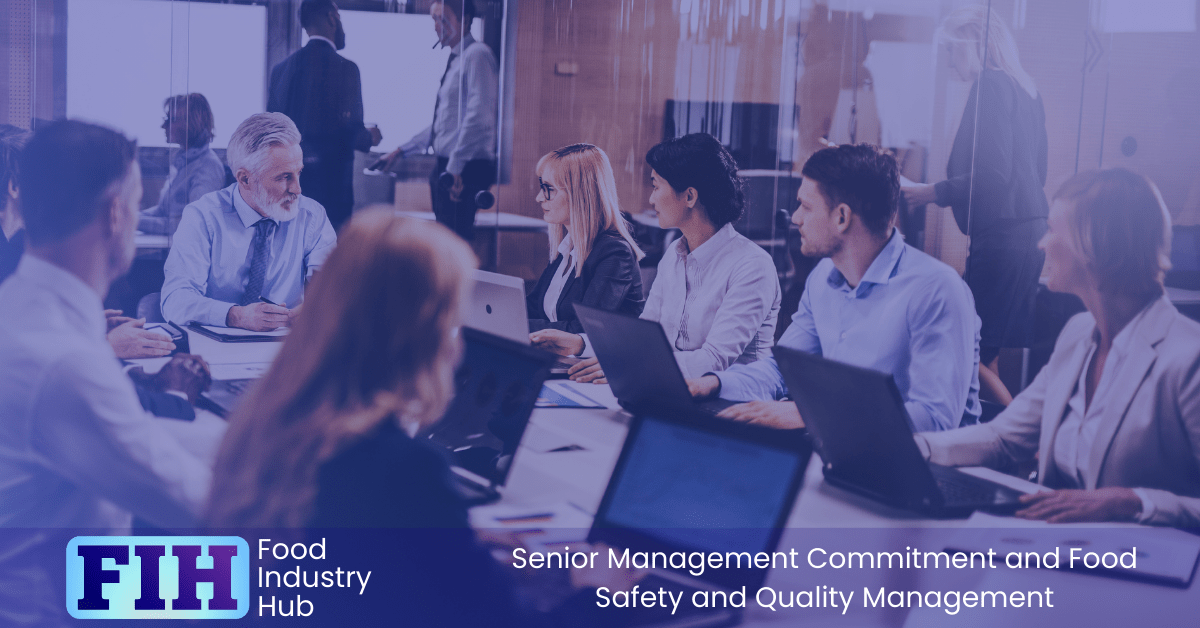
Facilitation Of Meetings
Let’s turn our attention to the facilitation of meetings.
It’s crucial that your site maintains a meeting programme which brings food safety, authenticity, legality, and quality issues to the senior management’s notice.
Make sure these meetings happen at least monthly.
The Site Must Have a Demonstrable Meeting Programme Which Enables Food Safety, Authenticity, Legality and Quality Issues to Be Brought to The Attention of Senior Management
You need to establish a concrete meeting programme that highlights food safety, authenticity, legality, and quality issues for the senior management’s attention. It’s important to design a structure where these points aren’t only discussed but also documented and acted upon. A demonstrable meeting programme is an effective tool for this purpose.
Creating such a programme requires careful planning. You’ll have to decide who’ll be attending these meetings and the items on the agenda. Make sure these meetings are structured to focus on the key issues at hand: food safety, authenticity, legality, and quality.
It’s equally important to set up a system for reporting and tracking the issues discussed during these meetings. This ensures that any problems identified aren’t forgotten but rather addressed in a timely manner.
Remember, the goal isn’t just to hold meetings but to create a tangible programme that ensures senior management is fully aware and engaged with food safety and quality management. It’s a crucial part of maintaining the highest standards for food safety and quality.
These Meetings Must Occur At Least Monthly
To ensure consistent engagement and progress, these critical meetings should be held at least once a month. It’s your responsibility as a senior manager to ensure these meetings happen regularly and are productive.
You should consider these monthly meetings as a platform for open discussion and decision-making. They’re an opportunity to review the overall performance and identify any potential risks or areas for improvement. You and your team can discuss new policies, procedures, or systems that have been introduced and assess their effectiveness.

Confidential Reporting
You should also make sure that the mechanism for reporting, such as a designated phone number, is well-communicated to all employees.
Lastly, it’s crucial that your senior management team has an effective process in place to assess and address these reported concerns.
The Company Must Have a Confidential Reporting System to Enable Staff to Report Concerns
In the interest of maintaining food safety and quality, it’s crucial for a company to implement a confidential reporting system that enables staff to voice their concerns without fear of reprisal.
This system is a cornerstone in fostering a culture of transparency and accountability. It empowers employees, making them active participants in ensuring the company’s standards are upheld, rather than passive observers.
Having a confidential reporting system means you’re not only promoting open communication, but also providing a safe platform for your staff to raise issues they may otherwise feel uncomfortable discussing.
It may be a discrepancy they’ve noticed in the food handling process, a concern about the freshness of ingredients, or any other issue that could potentially compromise the safety and quality of the food products.
The Mechanism (e.g. The Relevant Telephone Number) For Reporting Concerns Must Be Clearly Communicated to Staff
Once your company has a confidential reporting system in place, it’s your responsibility to clearly communicate this mechanism, such as the relevant telephone number, to your staff. This is more than simply posting a number on a bulletin board or sending a mass email. It involves making sure every employee, from the front line to the executive suite, understands what the system is, how it works, and why it’s important.
You should arrange a meeting, a training session, or a seminar where you can explain the importance of this mechanism. It’s important to underscore that this system is for the benefit of both the company and the staff. You need to assure your employees that they can use this system without fear of retaliation or judgment.
Communication shouldn’t be a one-off event. Regular reminders and updates about the system can help keep it at the forefront of everyone’s mind. You can also provide written materials, such as brochures or handbooks, that staff can refer to when needed.
The Senior Management Must Have a Process for Assessing Any Concerns Raised
As part of senior management, it’s crucial that you establish a process for evaluating any confidential concerns raised.
Keep meticulous records of these assessments.
If actions are necessary, ensure they’re accurately documented.
Records Must Be Kept of The Assessment of Confidentially Reported Concerns
To ensure transparency and accountability, you’ll need to maintain records of all confidentially reported concerns and the subsequent assessments by senior management.
These records are pivotal, reinforcing the credibility of your food safety and quality management system. They’ll serve as proof that management takes concerns seriously, diligently assessing each one, even when confidentially reported.
Keep these records safe; they’re essential.
Where Actions Are Needed as A Result of Confidentially Reported Concerns, Those Actions Must Be Documented
What happens when actions are needed due to confidentially reported concerns? Those actions must be documented.
As a senior manager, you’re responsible for ensuring this.
Any measures taken, changes implemented, or further investigations launched must be written down.
This not only ensures transparency, but also helps in tracking progress and validating that the concern raised has been addressed adequately.

The Senior Management Must Provide the Human And financial Resources Required to Produce Safe, Authentic, Legal Products to The Specified Quality
As a senior manager, it’s crucial you ensure the necessary human and financial resources are readily available to deliver safe, authentic, and legal products of the specified quality.
This involves proactive provisioning of resources, and when necessary, reactive provisioning in response to root cause analysis.
Your commitment to resource allocation can significantly contribute to maintaining food safety and quality standards.
Proactive Provision of Resources
Senior management needs to take a proactive approach in providing the necessary human and financial resources to ensure the production of safe, authentic, and legal products that meet the specified quality standards. It’s not just about reacting when things go wrong. You’ve got to plan ahead, anticipate needs, and allocate resources accordingly.
This proactive approach involves several key steps.
First, you need to accurately identify the resources necessary for production. This could be anything from skilled labour to high-quality raw materials or advanced equipment. You’ve also got to ensure that financial resources are available to cover these needs.
Second, you have to be sure these resources are readily available when they’re needed. This may involve strategic hiring, timely procurement, and effective budgeting.
Third, you need to continuously monitor the effectiveness of the resources provided. This might mean evaluating the performance and productivity of staff or assessing the quality of raw materials and equipment.
Reactive Provision of Resources Where Root Cause Analysis Identifies Inadequate Resource Provision as Having Contributed to A Failure to Produce Safe, Authentic, Legal Products to The Specified Quality
While a proactive approach is vital, there are times when reactive resources provision becomes necessary, especially when a root cause analysis reveals that inadequate resource provision has led to a failure in producing safe, authentic, and legal products of the specified quality.
It’s at these times that you, as senior management, must step in and rectify the situation.
It’s not enough to say you’re committed to food safety and quality management. You’ve got to show it. When a shortfall is identified, you need to provide the necessary human and financial resources swiftly and effectively. That’s what reactive resource provision is all about.
Picture this: your root cause analysis has just identified a lack of trained staff as a contributing factor to a failed product batch.
What do you do? You don’t just shrug it off. You invest in training, you hire more staff, or you redistribute existing staff to cover the gap.
It’s about making the right adjustments at the right time.

Information Review
Now, let’s turn your attention to the necessity of an ‘Information Review’.
As a part of senior management, it’s crucial for you to implement a system that ensures the site remains up-to-date and in line with safety and quality standards.
This practice isn’t just beneficial, it’s essential for the continued success and integrity of your company.
The Company’s Senior Management Must Have a System in Place to Ensure That the Site Is Kept Informed of And Reviews Industry Developments and Emerging Trends
You, as part of the senior management, have a critical role in ensuring the site’s upkeep.
Moreover, it’s paramount to understand and comply with all relevant legislation in the country where your products will be sold.
Scientific And Technical Developments
In today’s rapidly advancing world, it’s crucial for a company’s senior management to implement an effective system that keeps up with scientific and technical developments.
You need to continually enhance your knowledge and adapt your strategies accordingly.
This ensures your firm stays competitive and maintains the highest standards in food safety and quality management.
Industry Codes of Practice
Adhering to industry codes of practice, it’s crucial for your company’s senior management to implement a rigorous system, ensuring the site remains compliant with all food safety and quality standards.
This not only maintains reputation, but also secures customer trust.
New Risks to Authenticity of Raw Materials
It’s their responsibility to ensure the integrity of the raw materials used. This includes maintaining traceability, verifying supplier credibility, and implementing rigorous authenticity checks.
That’s how you combat food fraud.
All Relevant Legislation in The Country Where Products Will Be Sold
This not only protects your business from potential legal issues, but it also builds trust with consumers, who’ll appreciate your company’s commitment to adhering to local laws and regulations.
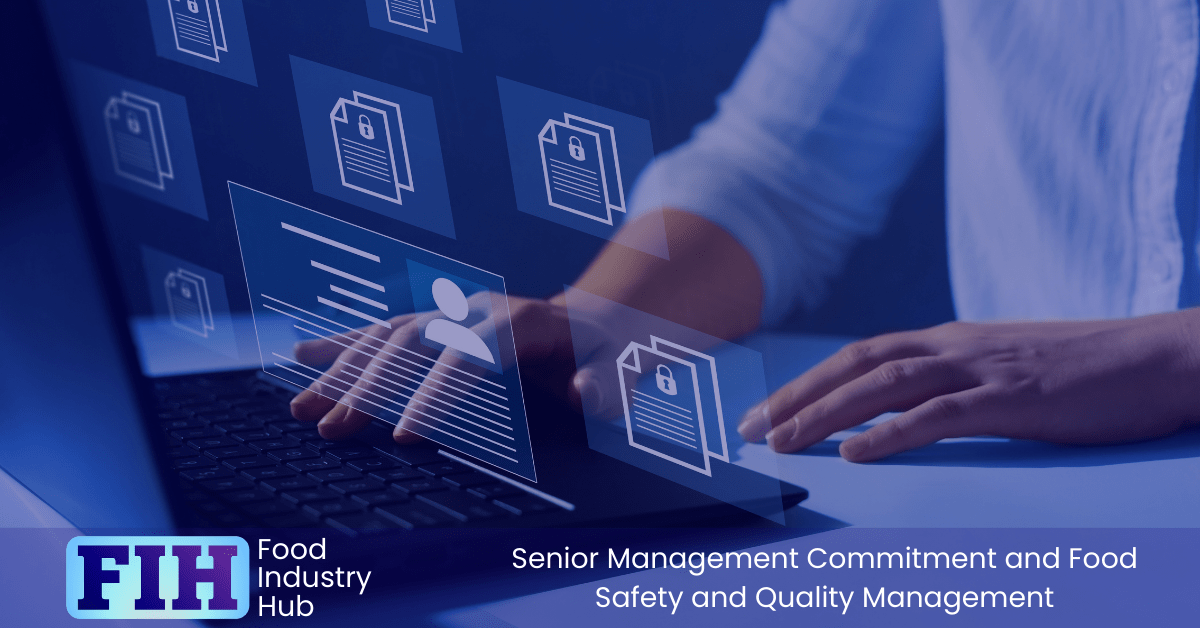
Voluntary Assurance Schemes
Compliance with voluntary assurance schemes can serve as a key indicator of senior management’s commitment to food safety and quality management.
It’s crucial that the highest-ranking operations manager participates in all audit meetings.
Additionally, other department managers need to be available as needed during audits, and a senior management team member should always be on hand to discuss the implementation of their food safety and quality culture development plan.
Compliance And Participation with Voluntary Assurance Schemes Can Indicate Senior Management Commitment
While it may not be immediately obvious, your company’s compliance and active participation in voluntary assurance schemes often serve as a clear indicator of your senior management’s commitment to food safety and quality management.
Such schemes, designed to uphold stringent standards in food safety and quality, can be demanding and complex. Yet, your management’s decision to willingly engage in these programs signals their readiness to go above and beyond regulatory requirements.
Involvement in these schemes represents a conscious decision to prioritise the safety and satisfaction of your consumers. It demonstrates a desire to foster a culture of excellence within your organisation, starting from the top. It’s a nod to transparency, integrity, and a long-term vision for the company.
The Most Senior Production or Operations Manager on Site Must Participate in The Opening and Closing Meetings of Audits Carried Out
For voluntary assurance schemes, it’s essential for the most senior production or operations manager on site to take part in both the opening and closing meetings of audits. This displays their commitment to maintaining high food safety and quality standards.
Your presence as the senior manager not only shows your dedication but also sets an example for the rest of the team. You’re sending the message that these audits aren’t just a formality, but an integral part of your operations. Your involvement assures that you’re fully aware of the processes, the standards you’re expected to maintain, and any potential gaps that may exist.
Your participation in the closing meetings, on the other hand, ensures that you’re directly informed of the audit findings. You can discuss any issues raised with the auditor, ask questions, and clarify any concerns you might have. It’s also your chance to agree on action plans for any identified non-conformities.
In a nutshell, your involvement as a senior manager in these meetings is pivotal. It’s not just about meeting compliance requirements, it’s about demonstrating leadership and commitment to food safety and quality management.
Relevant Departmental Managers or Their Deputies Must Be Made Available as Required During Audits
Ensuring the availability of relevant departmental managers or their deputies during audits is a good way to demonstrate senior management commitment. These leaders are critical players as they bring to the table in-depth understanding of their department’s operations, risks, and controls. Their presence ensures a comprehensive audit process.
You must remember, audits aren’t just a box-ticking exercise; they’re a chance to evaluate the effectiveness of your food safety and quality systems. Managers play a vital role in this process as they can provide valuable insights and make sense of the technical details. They’ll not only help clarify any ambiguous areas but also help identify potential improvements.
However, it’s not always possible for managers to be present at every audit due to their other responsibilities. That’s where deputies come in. They should be adequately informed and prepared to represent their manager if needed.
Deputies stepping in must be aware of the processes, risks, and controls within their department. This ensures continuity and maintains the integrity of the audit process.
A Member of The Senior Management Team on Site Shall Be Available During Audits for A Discussion on Effective Implementation of The Food Safety and Quality Culture Development Plan
You should also note the importance of having a senior management team member present during audits, specifically for discussions on the effective implementation of the food safety and quality culture development plan. Their presence doesn’t merely symbolise commitment, but it’s also practical. They’ve got a holistic view of the organisation and can provide valuable insights on how the plan is integrated into daily operations.
Auditors will appreciate the opportunity to dig deeper into the company’s food safety and quality practices. It’s about understanding how the company lives up to its commitment to safety and quality. The senior manager can explain how the company’s culture is shaped by the plan, and how it’s reinforced across all levels.
The senior manager’s involvement sends a strong message to the rest of the team. It demonstrates that the company’s commitment to food safety and quality isn’t just a written policy; it’s a way of life. This promotes a sense of responsibility and drives everyone to maintain the high standards set.
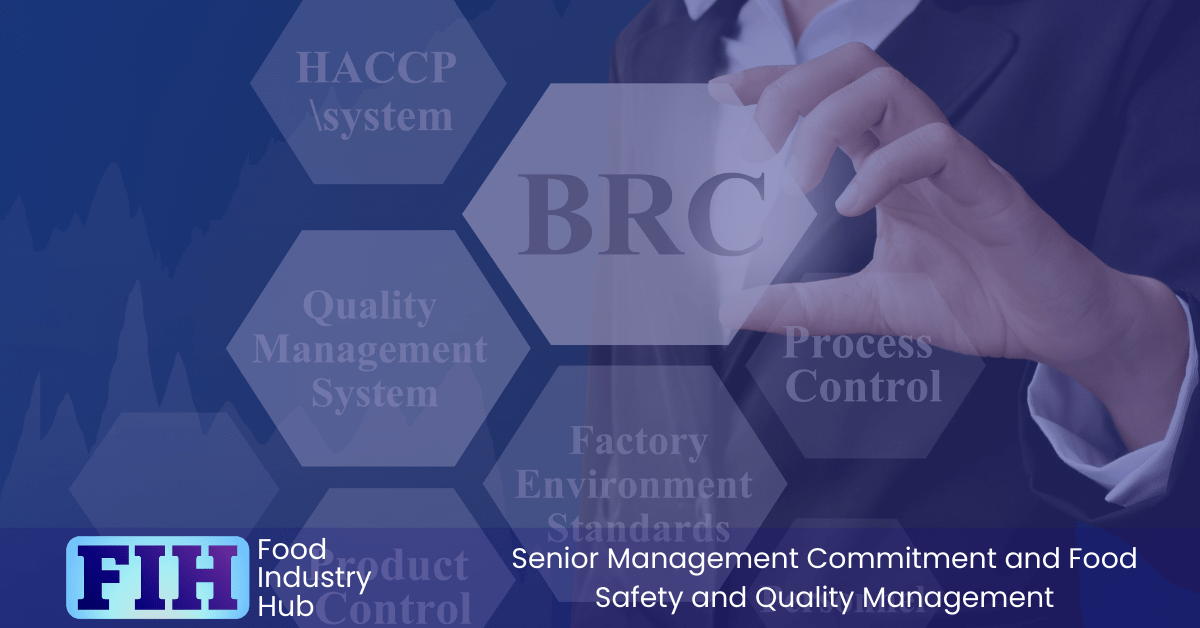
The Significance and Impact of Senior Management Commitment in Food Safety and Quality Management
Senior management’s dedication plays a pivotal role in ensuring food safety and quality management, significantly influencing the overall success of an organisation. When you’re part of an organisation where the top brass is fully committed to these goals, it’s easy to see the impact. Higher standards are set and frequently met. Everyone is motivated to follow suit, creating a culture of excellence that’s hard to beat.
This commitment isn’t just about meeting compliance requirements. It’s about going above and beyond, ensuring that the products you’re putting out into the world are the very best they can be. This dedication trickles down throughout an organisation, setting the tone for every action taken. When senior management leads by example, it inspires everyone else to strive for the same high standards.
This commitment ensures consistency. You’re not just delivering high-quality, safe food products once – you’re doing it every single time. And that’s how you build a strong, reliable brand that consumers can trust.
In essence, the significance and impact of senior management’s commitment in food safety and quality management can’t be overstated. It’s a driving force behind an organisation’s success, and a key component in building a reputation for excellence.
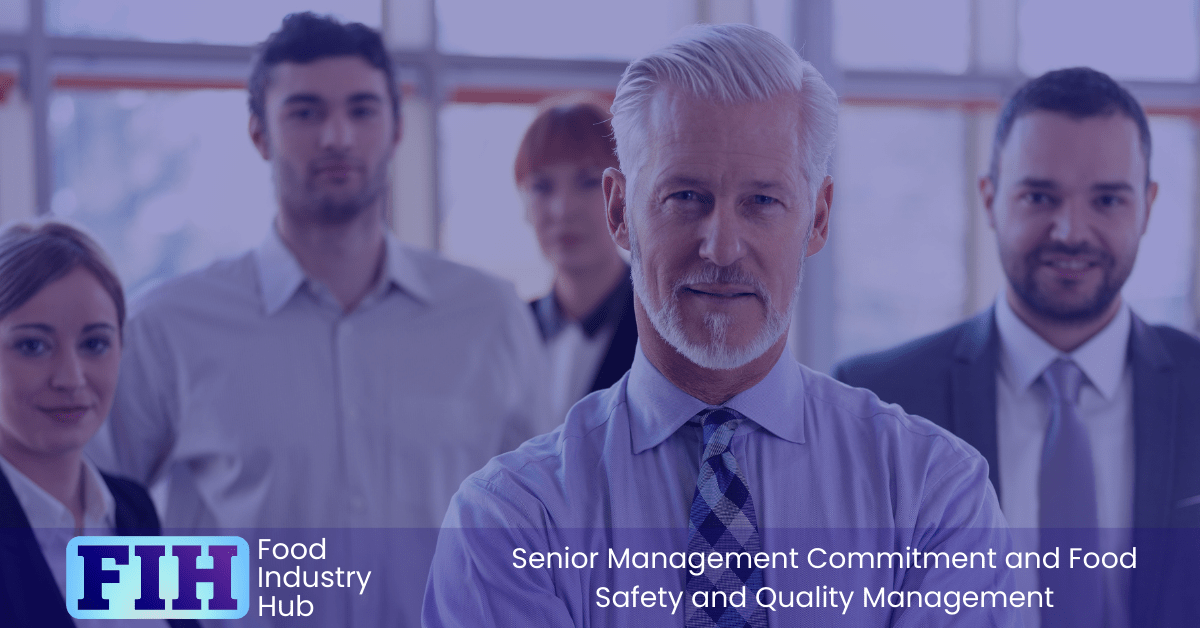
In Summary
You, as a senior leader, play a vital role in food safety and quality management.
Your commitment to clear policies, continuous training, and open communication fosters a strong culture within your team.
You don’t only ensure product safety and compliance, but also build consumer trust in your brand.
So, stay involved, be responsive to feedback, and always aim for improvement.
Your active participation makes a significant impact.
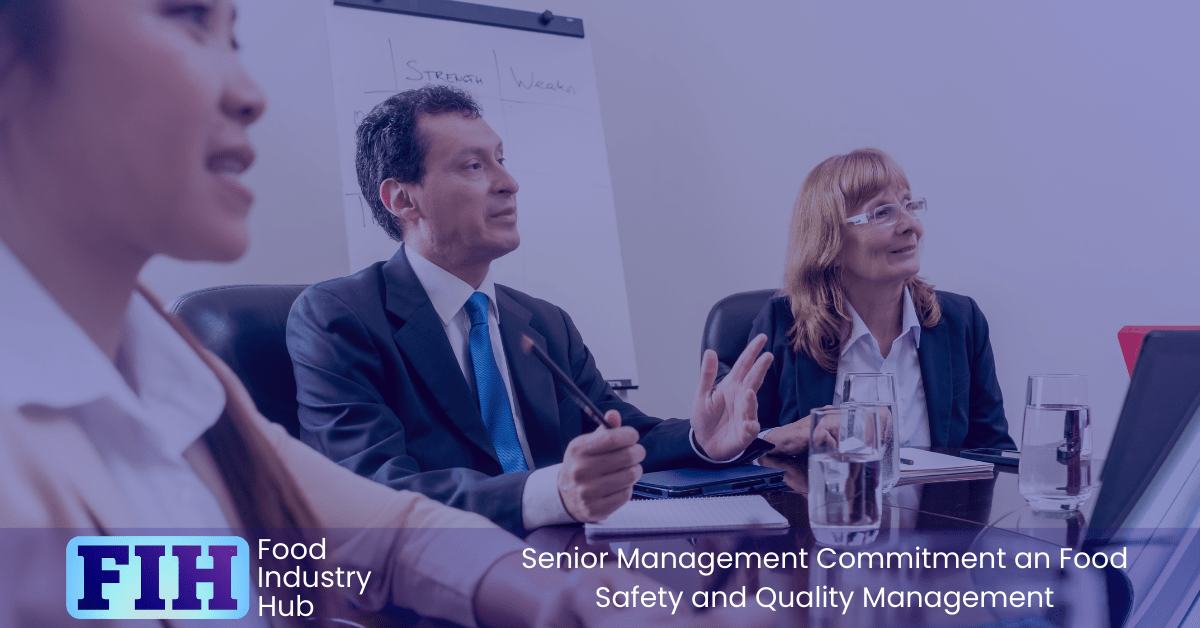
Further Resources
Food Industry Hub serves the food industry with a range of digital resources for the benefit of both commercial food manufacturers and food industry professionals.
For food manufacturers, we offer integrated management systems that give every user a direct interface with your QMS.
For food industry professionals, we provide an extensive signposting service in addition to informational content we hope you’ll find useful as you face new professional challenges. We have very ambitious plans to expand the range of services offered, and currently present informational content on management, safety and quality, food safety and quality culture, and professional success.

